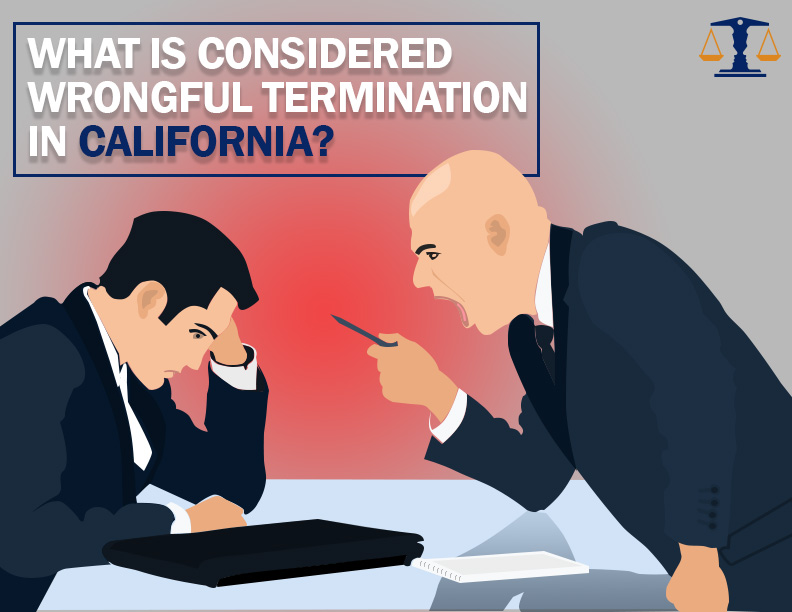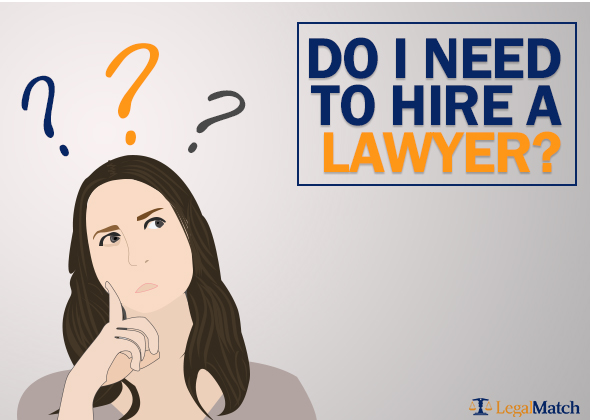
Wrongful termination occurs when an employer ends an employment relationship with an employee in a way that violates the rights of the employee. California is an at-will employment state.
This means that employees are free to leave their job at any time and for any reason. In addition, employers can terminate employees without providing a specific reason.
In the State of California, employment is considered at-will unless the employer and employee have an employment contract that governs the employer’s rights to fire the employee. There are certain exceptions to at-will employment and an employer’s ability to terminate an employee for no reason.
California termination laws prohibit fighting at-will employees for numerous unlawful reasons.
What Are Some Unlawful Reasons to Terminate an Employee?

California wrongful termination laws prohibit the firing on an employee for certain reasons that a court would consider illegal. California’s labor and employment laws specify certain protections that are afforded to all employees, including at-will employees.
The most common types of wrongful termination claims allege some type of employment discrimination under the California Fair Employment and Housing Act (FEHA). The FEHA applies to an employer with five or more employees.
FEHA prohibits discriminating against employees for several reasons, including:
- The employee is over age 40;
- Race, color, or national origin;
- Religion;
- Physical or mental disability;
- Pregnancy;
- Medical conditions;
- Genetic information;
- Marital status;
- Gender-related issues, including:
- sex;
- gender;
- gender identity;
- gender expression;
- sexual orientation; and
- Military or veteran status.
Firing an employee for any of the following reasons may also be considered wrongful termination:
- The employee’s political affiliation or beliefs;
- The employee is a crime victim and has to appear in court as a witness to that crime;
- The employee is a victim of domestic violence, sexual assault, or stalking and must miss work to get a restraining or protective order;
- In retaliation for the employee reporting an issue or filing a complaint based on some violation of the law, for example:
- health and safety violations;
- unpaid wages;
- labor law violations; or
- discrimination and harassment;
- Retaliation for being a whistleblower;
- An employee taking time off that is allowed by federal law, for example, the Family Medical Leave Act (FMLA);
- An employee taking time off that is guaranteed by state law, for example, the California Family Rights Act (CFRA), which requires employers with 50 or more employees to give their workers time off for:
- the birth of a child;
- adoption or a new foster care placement; or
- to care for their serious health condition or that of a family member;
- The New Parent Leave Act offers similar protections for parents who work for an employer with 20 or more employees.
- Constructive termination, or failing to address working conditions that are so unsafe or intolerable that an employee is more or less forced to quit;
- Violating the Worker Adjustment and Retraining Notification (WARN) Act, which requires sufficient notice before mass layoffs;
- The employee filed a workers’ compensation claim; and
- Terminating an employee for a reason that is against public policy;
- One example would be terminating an employee who refused to do something illegal.
In certain cases, it may be considered wrongful termination if an employee is terminated because they speak a different language while they are at work. There are certain exceptions, for example, when speaking a language, often English, is required to operate the business and the employer notified their employees that they must speak English and had communicated the consequences for not doing so.
Can I Sue My Employer for Wrongful Termination in California?
If an individual believes they have been wrongfully terminated, they may be able to file a lawsuit against their employer and recover damages. In some cases, a wrongful termination lawsuit may result in an individual being able to get their old job back.
It is important to note that filing a lawsuit in court may not be the first step, depending on the circumstances of the alleged wrongful termination. It may be necessary for an individual to file an administrative complaint with a government agency before they can file a lawsuit in court.
For example, if the employee’s wrongful termination claim is based on a violation of the Fair Employment and Housing Act, they are required to file a complaint with the California Department of Fair Employment and Housing first.
Find My Lawyer Now!
How Do I Prove Wrongful Termination?

Each different type of wrongful termination has certain elements that the plaintiff will be required to prove in order to be successful in their claim. In any wrongful termination case, the employee will have to present evidence that there was an employment relationship and that the employer terminated the employee or that the employment was constructively terminated.
The different types of wrongful termination cases that require different elements include the following:
- Discrimination claims: The employee must show that they are a member of a protected class and discrimination was the motivating factor for their termination;
- Harassment claims: The employee has to show that the reason they were terminated was due to their objection to being harassed;
- Breach of contract claims: The employee must show that they had a contract with their employer. They must also have evidence that their termination violated the terms of the contract;
- Public policy claims: The employee has to prove that they were fired for one of the protected reasons based on public policy, including:
- refusing to violate a statute or break the law;
- performing a statutory obligation;
- exercising their constitutional rights; or
- Reporting that a statute was violated in order to benefit the public.
The first step in a wrongful termination claim based on the Fair Employment and Housing Act (FEHA), such as claims of discrimination, harassment, or retaliation, is to file a pre-complaint inquiry with the California Department of Fair and Employment and Housing. This inquiry can request that the Department investigate the wrongful termination claim and resolve it.
A right to sue notice can also be requested. This notice paves the way for an individual to take their claim to court.
A California employment lawyer will be familiar with the requirements as well as the processes that can help an individual gather the necessary evidence for their claim as well as to ensure their claim is filed in a timely fashion.
How Long Do You Have to File a Wrongful Termination Lawsuit in California?
If an individual has a wrongful termination lawsuit claim, they must file it before the statute of limitations runs out. The statute of limitations provides the time frame in which a plaintiff can file their lawsuit once they have suffered harm.
The statute of limitations will depend on the nature of an individual’s claim and whether they had an employment contract with their employer. In each case, the statute of limitations will start to run on the date the individual was terminated.
If a lawsuit is based on the breach of an implied oral contract or a violation of public policy, the statute of limitations will be two years. If the claim is based on state whistleblower protections, the statute of limitations is three years.
If an employee’s claim is based on whistleblower protections under federal law, they have 180 days to file a complaint with the United States Department of Labor. A wrongful termination case based on a violation of the Fair Employment and Houston Act (FEHA) or the WARN Act must be filed within three years.
Do I Need to Hire a Lawyer for Help with Wrongful Termination in California?

If you believe you have a wrongful termination claim in California, you should consult with a California wrongful termination lawyer as soon as possible. These types of cases may be difficult to prove, so it is important to have legal representation throughout the process.
Your lawyer can ensure you begin the claim process properly and help you file with either a government agency or the court. Your lawyer can also negotiate on your behalf and represent you during any proceedings.
